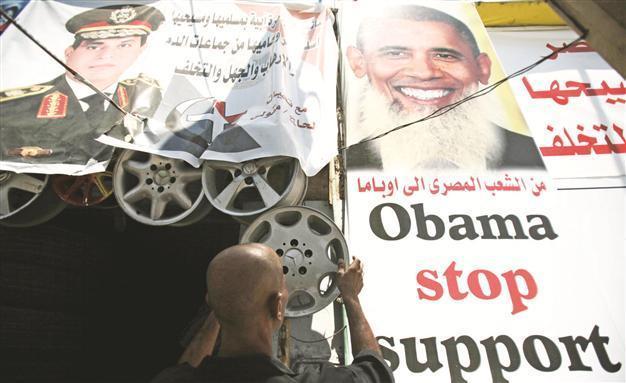Diplomacy to resolve Egyptian crisis fails
CAIRO - Reuters

Salah Abdel Moneim, 40, an anti-Mursi supporter of Egypt’s army works at his shop with poster of Egypt’s army chief General Abdel Fattah al-Sisi (L) and a poster depicting U.S. president Barack Obama with a beard (R) in downtown Cairo August 7, 2013. REUTERS photo
Egypt’s presidency said today that diplomatic efforts to end the country’s political turmoil had failed and warned that the Muslim Brotherhood of ousted President Mohamed Morsi would be held responsible for the consequences.
In a statement, interim President Adly Mansour’s office said the period of international efforts that began more than 10 days ago had “ended today.”
Envoys from the United States, European Union, Qatar and the United Arab Emirates have been trying to defuse the crisis and prevent further bloodshed. Turkey has been also involved in international peace efforts. Foreign Minister Ahmet Davutoğlu said on Aug. 6 that Turkey was working on a road map with the international community in order to end the political crisis in Egypt.
The state held the Muslim Brotherhood completely responsible for “the failure of these efforts and the later events and developments that might result from this failure related to breaches of the law and endangering civil peace”, the presidency statement added.
Thousands of supporters of Morsi, who was toppled by the army on July 3, have been staging protest sit-ins in two areas of Cairo for the last five weeks to demand his reinstatement.
Egyptian authorities had warned they were losing patience with the sit-ins, which can swell to tens of thousands. The presidency’s declaration suggests security forces could soon use force to break up the gatherings.
Prime Minister Hazem el-Biblawi met with army chief and Defense Minister General Abdel Fattah al-Sisi and Interior Minister Mohamed Ibrahim yesterday, state-run al-Ahram newspaper reported.
The discussions included the sit-ins, and emphasised the interior ministry’s mandate to deal with “violence and terrorism,” a reference to the Brotherhood.
At the biggest protest camp outside Rabaa al-Adawiya mosque in northeast Cairo, Morsi supporters were defiant.
“If they try to break up the sit-in there will be a huge loss of life. We are prepared for this. We leave our homes every day ready to die,” said Yusri Ismael, standing near sandbags and wearing a blue hard hat.
Almost 300 people have been killed in political violence since the overthrow, including 80 shot dead by security forces in a single incident on July 27.
The National Alliance to Support Legitimacy, which includes the Brotherhood, urged Morsi supporters to take to the streets for an “Eid of Victory.”
The leftist Popular Current party called for public Eid prayers in Tahrir Square, epicentre of the 2011 uprising that ousted autocrat Hosni Mubarak, and in squares across the country “to celebrate Eid and announce the completion of the revolution and to support national independence.”
The senior U.S. diplomat involved in the mediation effort left Egypt today, Cairo airport officials said shortly after the government declared diplomatic efforts had failed.
U.S. Deputy Secretary of State William Burns had held talks with both the government and members of the Muslim Brotherhood during the mediation effort, together with European Union envoy Bernardino Leon and the Qatari and UAE foreign ministers.
The EU said it was very concerned by the breakdown of the mediation effort and urged a peaceful solution.
A spokesman for EU foreign policy chief Catherine Ashton said the Europeans would “continue to do all we can to try and encourage people to get this inclusive dialogue going, that is so important to see a return to the democratic transition in Egypt”. Leon was still in Cairo talking to all sides, he added.
On Aug. 6, two visiting senior U.S. senators, Republicans Lindsey Graham and John McCain, called on the military to release political prisoners and start a national dialogue to return the country to democratic rule.
“I didn’t know it was this bad. These folks are just days or weeks away from all-out bloodshed,” Graham told the CBS network.
Egyptian officials and media reacted angrily to their criticism of the military takeover and call for dialogue.
